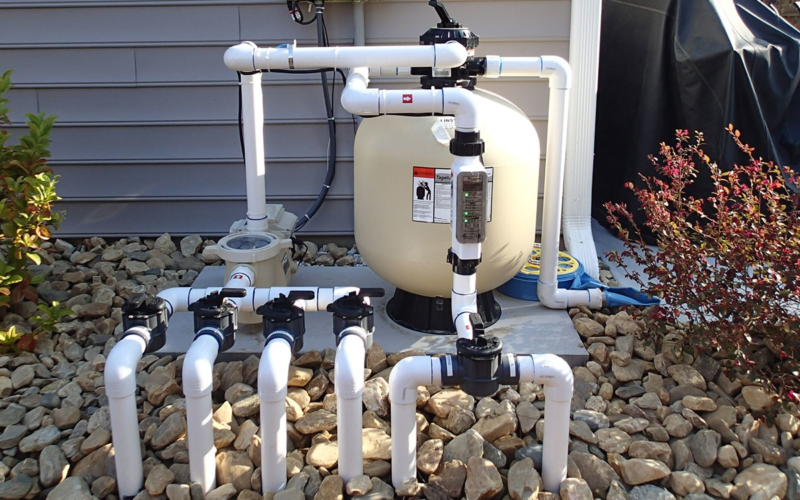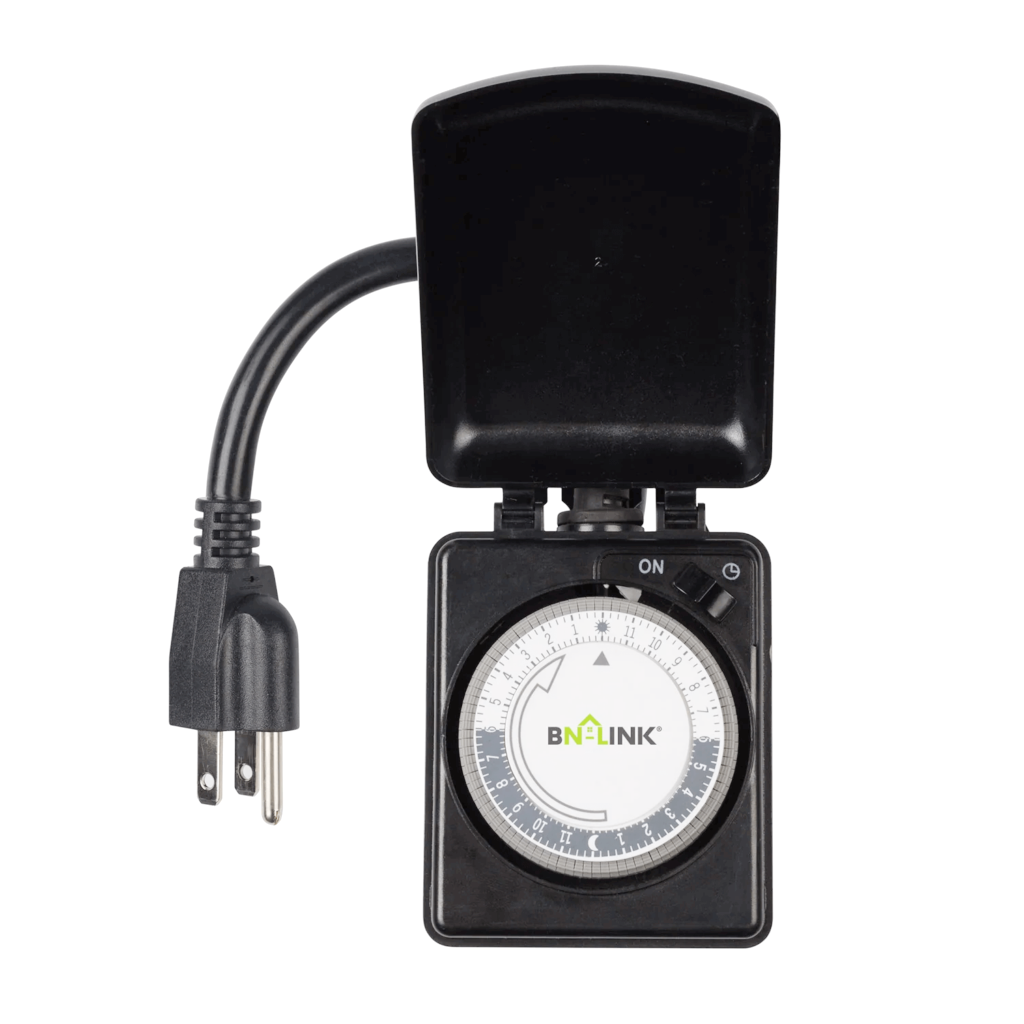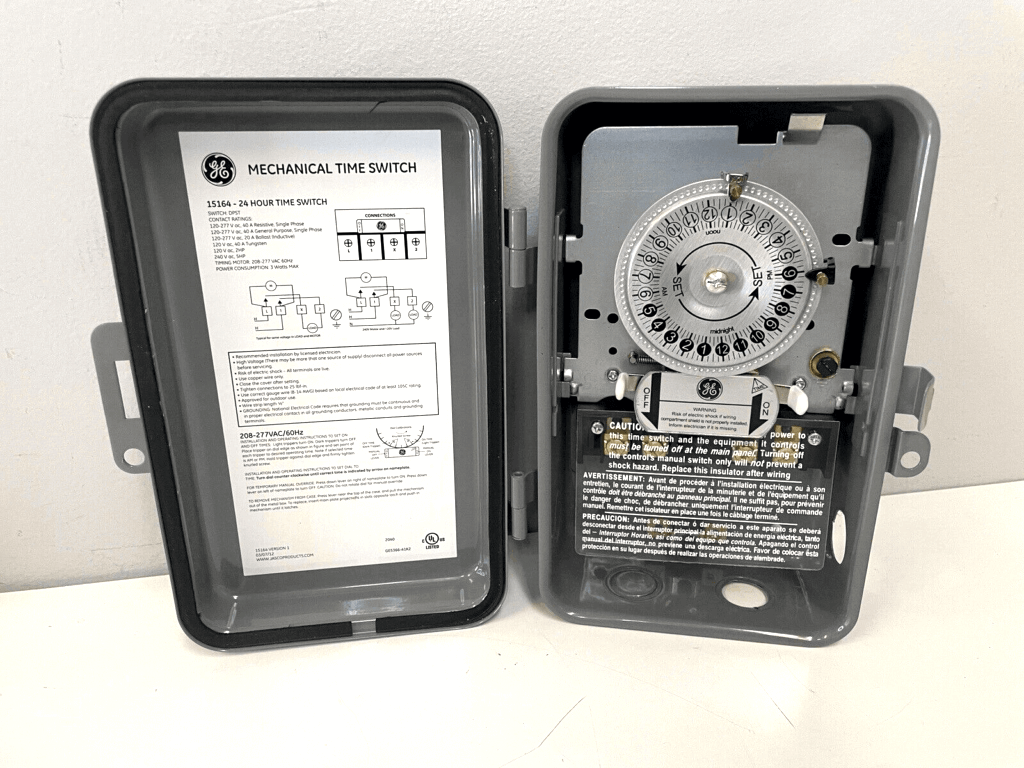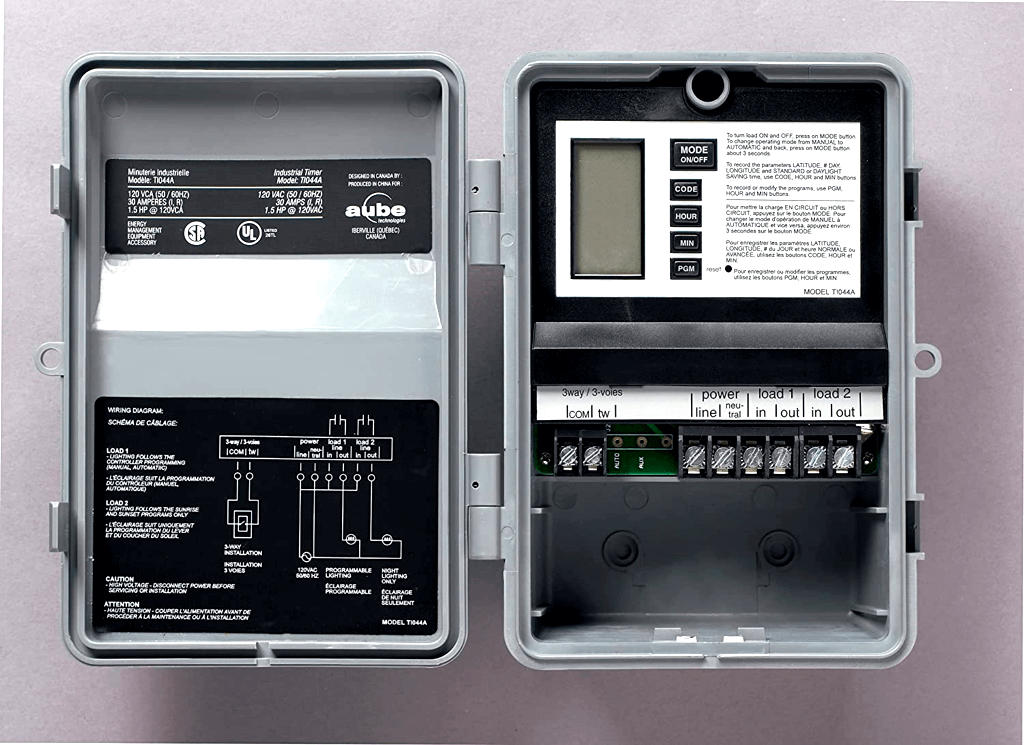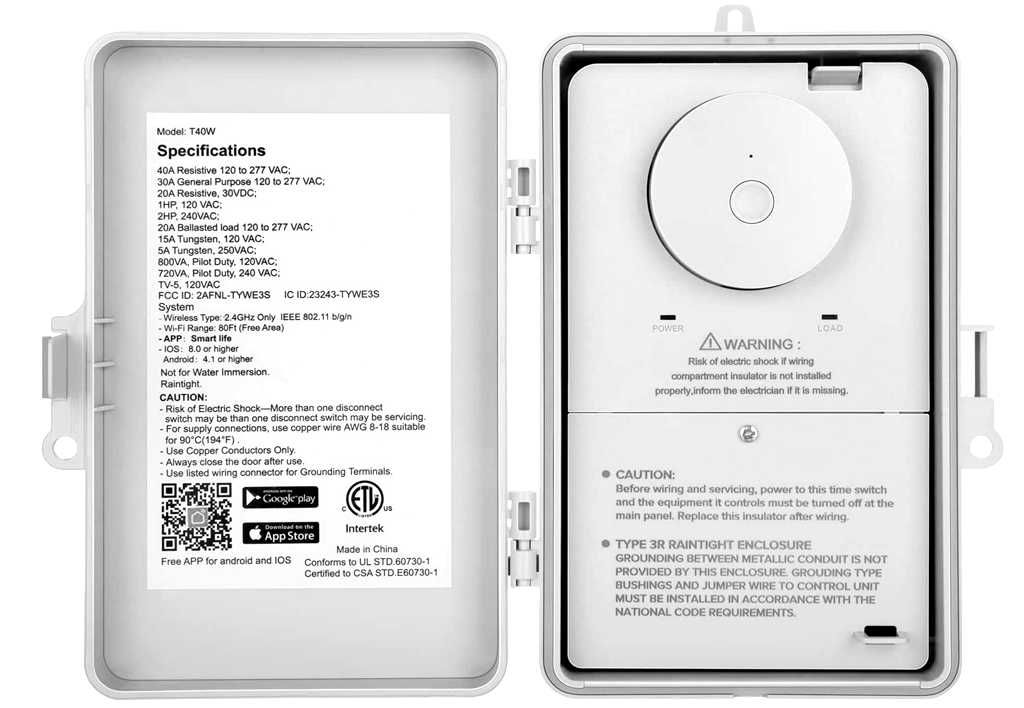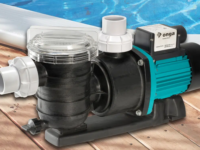Buying a pool is a grand and expensive affair, as you should spend $10,000+ at once. However, after the purchase, your expenses do not end, as you should maintain the pool (chemicals and equipment) and pay electricity bills. Believe us, it can be very expensive!
A rough estimate is that pool equipment consumes about 150–250 kW per month, which is $20–32 (and this number can get higher if you have more powerful equipment!). However, what does the pool timer have to do with it? Let’s not delay and move on to get acquainted with what a pool timer is and why you need it, as well as the best models that users have selected for themselves.
Best Pool Timers Comparison Table
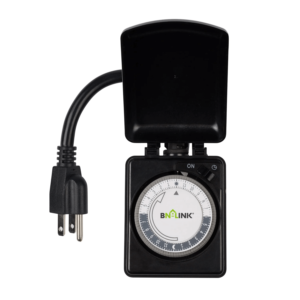 Winning category The best in withstanding extreme weather conditions | Characteristics Amazon rating: ⭐️ 4.6 Timer type: Mechanical Placement: Indoor/Outdoor Voltage: 125 VAC Cycle: 24-hour Material: Plastic What makes it the best The most reliable timer – can withstand extreme ambient temperatures and weather conditions The most compact timer – its size is 2–3 times smaller than other models The most durable – 60% of users note that the mechanism works flawlessly Jump to the detailed review |
 Winning category The best heavy-duty mechanical timer | Characteristics Amazon rating: ⭐️ 4.2 Timer type: Mechanical Placement: Indoor/Outdoor Voltage: 120/240/277 VAC Cycle: 24-hour Material: Metal What makes it the best The most durable case – made of stainless steel The clearest instructions – 40% of users note that the wiring diagram is simple and understandable The most versatile connection – timer automatically detects the voltage from 120V to 277V Jump to the detailed review |
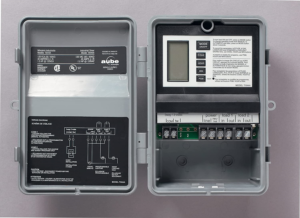 Winning category The best digital timer | Characteristics Amazon rating: ⭐️ 4.5 Timer type: Digital Placement: Indoor/Outdoor Voltage: 120/240/208 VAC Cycle: 7-day Material: Plastic What makes it the best The easiest to use – convenient control with 5 buttons and digital interface The easiest to program – 14 settings that are set for 7 days The most convenient program saving – retains timer settings for up to 30 days in case of a power failure Jump to the detailed review |
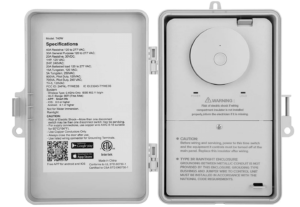 Winning category The best smart timer | Characteristics Amazon rating: ⭐️ 4.5 Timer type: Digital with Wi-Fi connection Placement: Indoor/Outdoor Voltage: 120/240/277 VAC Cycle: 7-day Material: Plastic What makes it the best The smartest timer – connects to Wi-Fi and is compatible with Amazon Echo/Alexa, Google Home Assistant, The most convenient control – operate remotely using your smartphone through the Smart Life application The most extensive choice of programs – 4 different modes of operation (program, countdown, random, repeat) for flexible timer settings Jump to the detailed review |
What Is a Pool Timer & Why Do I Need It?
The pool timer is the device you use to turn the pump on/off automatically. You can choose from three types of pool timers that work differently.
| Timer type | Brief description | Detailed review |
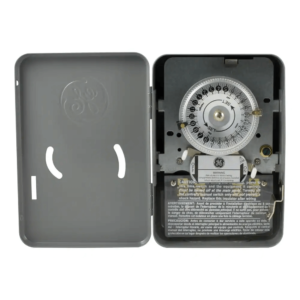 Mechanical | This device has a dial input interface, so it's easy to program but has limited settings (a minimum of two times less than digital and smart timers). Also, you can program a mechanical timer only for 24 hours, unlike other types that support a seven-day schedule. | Jump to the detailed review |
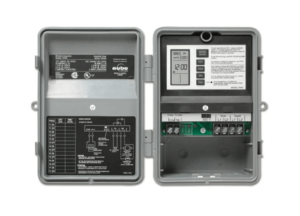 Digital | This device has a digital board that controls the settings. Often such timers have a small screen and button input interface. They provide at least twice as many settings and allow you to set the time with an accuracy of one minute, unlike mechanical ones, where intervals are more than 15 minutes. | Jump to the detailed review |
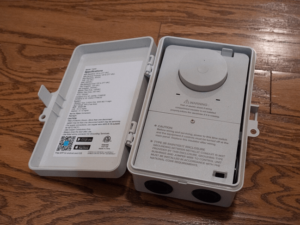 Smart | You can connect to a 2.4GHz Wi-Fi network to control it using your phone. The application allows you to set an unlimited number of settings for each day of the week and use different modes (for example, a countdown). Moreover, you can use the timer as a smart home device by connecting it to Amazon Alexa or Google Home Assistant. | Jump to the detailed review |
Overall, the pool timer is a useful device because it saves you money. Its cost is equal to three months of using a pool pump. Each next month will bring you about $20. Sounds tempting, doesn’t it?
How Do They Work?

The principle of timers is straightforward. You connect them to a pool pump and a grounded power source. Next, you should configure the on and off settings.
- Mechanical. Turn the dial counterclockwise and set the trippers to the desired time.
- Digital. Use the buttons and the digital interface to set the time, with adjustable intervals from one minute to one day.
- Smart. Connect the timer to 2.4 GHz Wi-Fi, install the necessary application on your smartphone, synchronize the device and the timer, and set the required number of periods in the application.
Further, the timer will automatically turn on/off the power supply to the pump. Everything is simple!
How To Choose A Pool Timer
When choosing the best timer pool models, we found that the most important criteria for users are the following.
| Criteria | Description | Importance |
 Solidity and durability | The best timer should be reliable, withstand extreme temperature changes (-40° to 130°F), and be dust and moisture-resistant. | 🥇 32 votes out of 225 total (14.2%) |
 Ease of installation | The best timer can be easily installed and wired. | 🥈 25 votes out of 225 total (11.1%) |
 The quality of the mechanism | The best timer should work accurately and not accelerate time. | 🥈 24 votes out of 225 total (10.6%) |
 Ease of programming | The best timer should be easy to set up, have a clear interface, and have a convenient input interface (dial, buttons, or convenient app). | 🥉 23 votes out of 225 total (10.2%) |
 Simple instructions | The best timer should have clear installation instructions and a | 🥉 17 votes out of 225 total (7.5%) |
4 Best Pool Timers Comparison to Save On Electricity Bills
It can be challenging to define whether a pool timer complies with all the above-mentioned criteria and then choose the best model for you. Therefore, we conducted this research to compile a list of the top four pool timers including all the types (mechanical, digital, and smart) and compared them to each other to help our readers choose the best option.
BN-LINK Outdoor Mechanical Timer – The Best in Withstanding Extreme Weather Conditions
The best in withstanding extreme weather conditions
| Extended characteristics | Amazon rating: ⭐️ 4.6 Timer type: Mechanical Input interface: Dial Placement: Indoor/Outdoor Ambient Temperature: –40°F to 149°F Mounting Type: Protruding Cycle: 24-hour Interval: 15 minutes Number of programs: 48 on/off settings in 24 hours Material: Plastic |
| Electrical Ratings | 125VAC, 60Hz 15A max., 1875W resistive or general purpose 8A tungsten lamp 1/2 HP, TV-5 |
BN-LINK Outdoor Mechanical Timer is the best in withstanding extreme weather conditions. This model, like the Suraielec Wi-Fi Pool Timer, can operate at ambient temperatures of -40°F to 149°F. However, unlike Suraielec, BN-LINK is a mechanical timer that is not electronically controlled, so it is less prone to breakage.
What’s more, the BN-LINK Outdoor Mechanical Timer is easier to place in an accessible and convenient place for you because it is 2–3 times smaller than other models. Despite the compactness, the timer still has a double ground, which protects you from electric shock.
It is worth noting that the BN-LINK Outdoor Mechanical Timer has a 125V electrical rating. Therefore, you can’t use this with devices that require 240V or 277V. Also, BN-LINK is only 24 hours programmed but allows you to set up to 24 modes (48 on/off). It is almost four times more than the GE Mechanical Box Timer.
Pros
- The most reliable timer – 40% of users say that the timer can withstand extreme ambient temperatures (–40°F to 149°F) and weather conditions (rain, snow, and icing)
- The most compact timer – its compact size (2–3 times smaller than other models) allows placing the timer horizontally and vertically, unlike other models which are recommended to be placed only vertically
- The most durable – 60% of users note that the mechanism works flawlessly and 60% of users admit that it is very sturdy due to the solid polypropylene
- Plastic case and double grounding will protect you from electric shock
Cons
- Its voltage is 125V, so you will not be able to connect it to 240V or 277V
GE Mechanical Box Timer – The Best Heavy-Duty Mechanical Timer
The best heavy-duty mechanical timer
| Extended characteristics | Amazon rating: ⭐️ 4.2 Timer type: Mechanical Input interface: Dial Placement: Indoor/Outdoor Ambient Temperature: –40° to 130°F Humidity: 0–95% RH, non-condensing Mounting Type: Protruding Cycle: 24–hour Interval: 30 minutes Number of programs: up to 7 Material: Metal |
| Electrical Ratings | 120-277 VAC, 40A resistive 120-277 VAC, 30A general purpose 120 VAC, 1 HP 240 VAC, 2 HP 120-277 VAC, 20A ballast 120 VAC, 15A tungsten 120 VAC, 800 VA, pilot duty 240 VAC, 720 VA, pilot duty 30 VDC, 20A resistive |
GE Mechanical Box Timer is the best heavy-duty mechanical timer, and its main advantage lies in its simplicity. First, like the BN-LINK Timer, it has a dial input interface that works even when there is no power. Secondly, connecting is easy because the timer automatically determines the required voltage. Therefore, you can use it with pool pumps of any size.
Also, GE Mechanical Box Timer has a metal case with the Nema-3R specification. Thus, it can protect the mechanism from rain, snow, and dust. However, you don’t have to worry about the difficulty of installing the metal case because it has knockouts on the inside that you can remove with a screwdriver.
GE Mechanical Box Timer allows you to program the on/off time for 24 hours. However, this model has 30-minute intervals, unlike the BN-LINK Outdoor Mechanical Timer, which allows setting the timer in 15-minute intervals.
Pros
- The most durable case – it is the only timer among the best models, which has stainless steel waterproof case
- The clearest instructions – 40% of users, which is 20% more than others, admit that instructions and wiring diagrams are easy-to-follow
- The most versatile connection – unlike another mechanical timer, it works when connected to 120V, 240V, and 277V
- A lockable case protects from unwanted access
Cons
- The timer has only up to 7 setting modes, which is two to six times less than other models
Honeywell Home Industrial Timer – The Best Digital Timer
The best digital timer
| Extended characteristics | Amazon rating: ⭐️ 4.5 Timer type: Digital Input interface: Buttons Placement: Indoor/Outdoor Ambient Temperature: –40°F to 122°F Mounting Type: Protruding Cycle: 7-day Interval: minutes, hours, days Number of programs: up to 14 Material: Plastic |
| Electrical Ratings | 120/208/240 VAC, 50/60 Hz 120 VAC, 1.5 HP, 30A resistive, 10A ballast 240VAC, 2 HP, 30A resistive, 10A ballast |
Honeywell Home Industrial Timer is the best digital timer. First, this model is the easiest to use. Almost 60% of users state that this timer is easy to use because it has a clear interface that consists of 5 buttons and a screen. Compared to the Dewenwils Digital Timer Box, which is the #2 digital model, users did not comment that it is easy to interact with.
Also, users note that the Honeywell Home Industrial Timer has a very convenient override function. It interacts with the set timer setting and allows you to temporarily override it. The first click on the override button will allow you to make changes, and the second will cancel them and return the settings to their previous form.
Besides, almost 100% of users note that the Honeywell Home Industrial Timer is easy to program. You can set up to 14-time settings (two for each day), each of which allows you to set time intervals from one minute to one day. In comparison, the #2 digital timer received 20% fewer positive reviews for ease of programming.
It is also worth noting the main advantages of a digital timer over a mechanical one. Firstly, you do not need to twist the mechanisms because the input interface is not a dial but a button. The information after the input will be displayed on the screen. Secondly, the digital timer allows you to program at least twice as many settings and set the time in fineness to the minute, unlike mechanical ones, which have 15-minute intervals.
Pros
- The easiest to use – the only timer on the list that has a digital screen for visual display of settings
- The easiest to program – almost 100% of users (20–40% more than other models have) state that they had no issues while programming it
- The safest timer saving – retains timer settings during power outages for up to 30 days, so you don’t have to worry about losing your settings
- Allows you to set the timer with an accuracy of one minute to one day for 14 different settings (2 settings per day)
Cons
- 60% of users say that the instructions are incomprehensible. In this case, you can use the extended user manual
Suraielec Wi-Fi Pool Timer – The Best Smart Timer
The best smart timer
| Extended characteristics | Amazon rating: ⭐️ 4.5 Timer type: Digital with Wi-Fi connection (2,4 GHz) Input interface input: Smart Life App/Voice/Manual Compatibility: Amazon Echo/Alexa, Google Home Assistant, IFTTT Placement: Indoor/Outdoor Ambient Temperature: –40°F to 149°F Mounting Type: Protruding Cycle: 7-day Interval: minutes, hours, days Modes: Program, Countdown, Random, Repeat Material: Plastic |
| Electrical Ratings | 120-277 VAC, 40A resistive 120-277 VAC, 30A general purpose 30VDC, 20A resistive 120 VAC, 1HP 240VAC, 2HP120-277 VAC, 20A ballasted load1 20 VAC, 15A tungsten250VAC, 5A tungsten 120VAC, 800VA, pilot duty 240 VAC, 720VA, pilot duty 120VAC, TV-5 |
Suraielec Wi-Fi Pool Timer is the best smart timer. First, it allows you to integrate the timer into the smart home ecosystem via Amazon Alexa and Google Home Assistant. Thus, you can manage your timer with your voice assistant. Secondly, almost 100% of users note the ease of connecting the device to Wi-Fi. In comparison, the Dewenwils Smart Wi-Fi Box, which is the #2 smart model, has 20% fewer positive reviews regarding the ease of connecting to Wi-Fi.
It is worth noting that Suraielec Wi-Fi Pool Timer has the most convenient application. According to user reviews, it is 60% more convenient than the Dewenwils Smart Wi-Fi Box. You can add multiple timers with different on and off settings that will repeat on specific days of the week.
Special attention deserves the presence of the four modes. You can choose from the following:
- Program – allows you to set the start/end time of the on/off setting with an interval of a minute, which will repeat weekly for the selected days
- Countdown – allows you to set a countdown that, after a specified period, will turn on or off the device to which the timer is connected
- Random – randomly controls the device during the specified period while you are away from home and has a setup process similar to the “Program” mode
- Repeat – allows you to set the device to turn on and off repeatedly during a specified period. For example, you can set it to turn on for 10 minutes and turn off for 5 minutes, which will repeat from 8 AM to 8 PM.
Pros
- The smartest timer – you can connect the timer with other smart home devices using Amazon Alexa or Google Home Assistant
- The most convenient control – it is the only model among the best that allows you to set the timer using your smartphone (via the Smart Life app) or by voice input via Alexa or Google Home Assistant
- The most extensive choice of programs – 4 different modes with personalized settings: Program – usual timer with; Countdown – maintains current state until the end of the countdown; Random – randomly controls device when you are away from home; Repeat – repeatable on/off settings
- Can operate when ambient temperatures are up to 149°F, which is 19°F more than other models
Cons
- A timer can be connected only to a 2.4 GHz Wi-Fi network. Therefore, you should buy a router, which is compatible with Alexa or Google Home Assistant
Guide on How to Install Pool Timer
Installing a pool timer is not a complicated process, but it does involve a few important things you need to know.
- Step #1. Turn off the pump and the electricity. Also, use a voltmeter to check the voltage on the wires.
- Step #2. Remove the knockouts from the box walls and run wires through them, and attach the box to the wall. For concrete, we recommend using a 3/16″ drill and 1/4″ x 1-1/4” concrete screws to install it securely.
- Step #3. Wrap the ground wires around the ground terminal in the timer box to ground them.
- Step #4. Connect the timer to electricity using a wiring diagram that shows how to do this correctly, depending on the voltage. You can find the wiring diagram in the Amazon product description or instructions. Below we give you examples of diagrams for connecting to 120V and 240V.
| Model | Wiring diagram |
| GE Mechanical Box Timer | 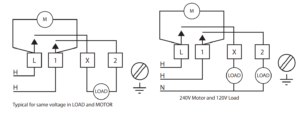 |
| Honeywell Home Industrial Timer | 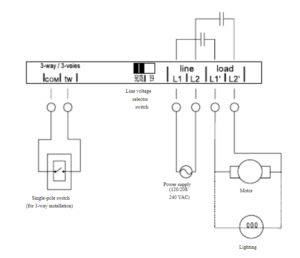 |
| Suraielec Wi-Fi Pool Timer | 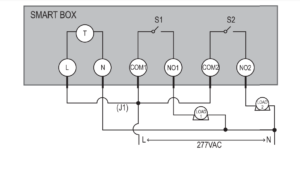 |
| Intermatic T103 | 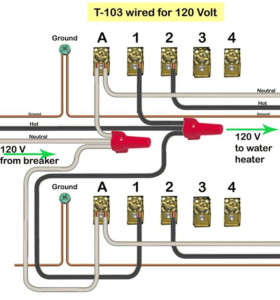 |
| Intermatic T104 | 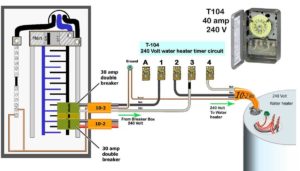 |
- Step #4.5. Check the wires to make sure they are not exposed. If you find such wires, you should wrap the exposed areas with insulating material, as it is an excellent .
✅ Done! Now you can turn on the electricity and program the timer.
How Much Money You Can Save on Electricity Bills
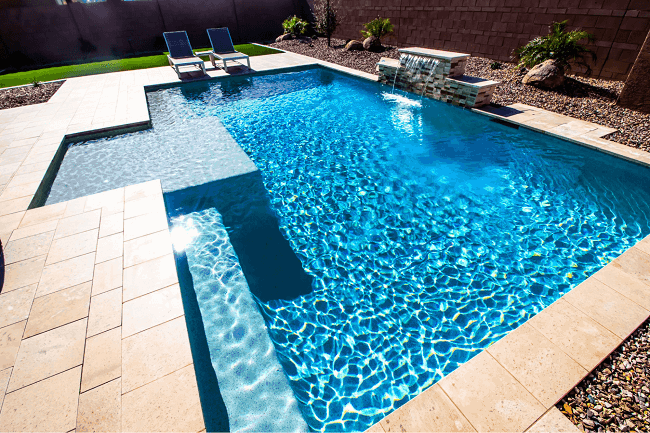
All pool owners recommend running the pump for 4–8 hours a day (depending on pool size) to keep the water clean. Thus, you should turn the pump on/off manually.
What if you forget to do this, or you are not at home? Each extra hour of the pump can be estimated as follows:
*The average cost of 1000 watts or 1 kW is 13.04 cents.
| Power in hp | Power in | Cost per 1 hour |
| 1 hp pump | 745.7 watts | 9.72 cents |
| 1.5 hp pump | 1118.55 watts | 14.59 cents |
| 2 hp pump | 1491.4 watts | 19.44 cents |
Suppose you should go away for a month and leave the pump on. It will work 16–20 hours more each day. Therefore, extra hours of the pump can be estimated as follows:
- 1 hp pump – $46.66–$58.32
- 1.5 hp pump – $70.03–$87.54
- 2 hp pump – $93.31–$116.64
As you can see, a pool timer can save you a bunch of money!
Summary
The pool timer is a functional device that allows you to save several tens of dollars per month. You can choose from three types of timers according to your needs:
- Mechanical – simplicity and reliability;
- Digital – advanced functionality and many settings;
- Smart – control with voice assistants and a mobile application.
To make sure you don’t miss out on all the information about pool timers, we once again suggest you find out what they are and why you need them, get acquainted with the four best models and their pros and cons, and find out how much you can save using a pool timer.
FAQ
⏲ How to set the timer on the pool clock?
It depends on the type of pool timer: on a mechanical, you should turn the dial counterclockwise and set the trippers to the desired time; on digital, it is enough to select the desired time by pressing the buttons; and on the smart timer, you set the period through a mobile application or voice assistant.
⌛️ How to set the pool timer to 24 hours?
To do this, you need a digital or smart timer. For the first type, you should switch the period from minutes to days and set the setting. For the second type, set the required time through applications.
💲 How much does it cost to replace a pool timer?
The cost of replacing the timer varies from $15 to $100+ depending on the type of device.
⏰ How many hours per day should the pool pump run?
You should run the pool pump for four to eight hours every day. Also, you don’t have to run the pump for a continuous period. You can split it into multiple sessions.
🕔 What is the best time to run the pool pump?
If you want to save money on chemicals, you should run the pump on sunny days to distribute the chlorine throughout the water and prevent the sunlight from destroying it.
